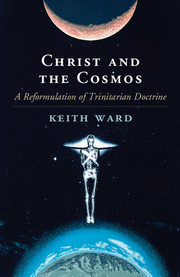Book contents
- Frontmatter
- Contents
- Preface
- Acknowledgements
- PART I THE THREEFOLD NATURE OF THE DIVINE BEING
- PART II THE BIBLICAL SOURCES OF TRINITARIAN THOUGHT
- PART III THE TRINITY, IMMANENT AND ECONOMIC
- 11 Why Three?
- 12 The Trinity and Revelation
- 13 Hegel and Modern Theology
- 14 The Immanent Trinity
- 15 The Identity of the Immanent and the Economic Trinity
- 16 Hegel Again
- 17 What Creation Adds to the Trinity
- 18 The Epistemic Priority of the Economic Trinity
- 19 The Trinity and Naive Realism
- 20 The Trinity and the Cosmos
- 21 Revelation and the Immanent Trinity
- PART IV THE SOCIAL TRINITY
- PART V THE COSMIC TRINITY
- Bibliography
- Subject Index
- Name Index
18 - The Epistemic Priority of the Economic Trinity
from PART III - THE TRINITY, IMMANENT AND ECONOMIC
Published online by Cambridge University Press: 05 September 2015
- Frontmatter
- Contents
- Preface
- Acknowledgements
- PART I THE THREEFOLD NATURE OF THE DIVINE BEING
- PART II THE BIBLICAL SOURCES OF TRINITARIAN THOUGHT
- PART III THE TRINITY, IMMANENT AND ECONOMIC
- 11 Why Three?
- 12 The Trinity and Revelation
- 13 Hegel and Modern Theology
- 14 The Immanent Trinity
- 15 The Identity of the Immanent and the Economic Trinity
- 16 Hegel Again
- 17 What Creation Adds to the Trinity
- 18 The Epistemic Priority of the Economic Trinity
- 19 The Trinity and Naive Realism
- 20 The Trinity and the Cosmos
- 21 Revelation and the Immanent Trinity
- PART IV THE SOCIAL TRINITY
- PART V THE COSMIC TRINITY
- Bibliography
- Subject Index
- Name Index
Summary
The Roman Catholic lay theologian Catherine Lacugna stresses the epistemic distinctiveness of the economic Trinity, even though she quotes Rahner's Rule with approval. I think she means that it is not the case that God in se is completely unknowable (as in some traditional Orthodox theology) or that God in se is simple, changeless, and self-complete (as in some traditional Latin theology), whereas God in relation to us is dynamic, personal, and relational. ‘God for us is who God is as God’ (Lacugna, 1991, p. 305). God in relation to us is disclosed as personal, free, self-giving, and loving, and that is how God really is. There is nothing more and other than that. In this respect, the immanent Trinity speaks of the same God as the economic Trinity.
She argues, however, that Rahner's Rule is not wholly clear. You could interpret the identity of immanent and economic Trinities as saying that there are no properties that one aspect has that the other lacks. That would be, in effect, to say that there is no distinct immanent Trinity. There is only the economic Trinity, and when we see it we see exactly how God really is. Sometimes Lacugna writes as though this is what she thinks. She denies that ‘distinctions in the economy originate in and are grounded in distinctions in God’ (Lacugna, 1991, p. 221). That sounds as if there are no hidden distinctions in God which give rise to the divine relations to us. God's relations to us constitute what God is. That sounds like a form of direct (sometimes called naive) realism, which states that what we see is exactly what exists. So there is no such thing as an immanent Trinity in addition to and different in any respect from the economic Trinity.
This view could be pushed even further, and sometimes Lacugna seems to do that. She says, ‘God's being-in-relationship-to-us is what God is’ (Lacugna, 1991, p. 250). It is not just that God is always like what we see or experience God to be. Rather, there is nothing more to God than what we experience. That would mean that God was always in relation to us.
- Type
- Chapter
- Information
- Christ and the CosmosA Reformulation of Trinitarian Doctrine, pp. 120 - 127Publisher: Cambridge University PressPrint publication year: 2015



